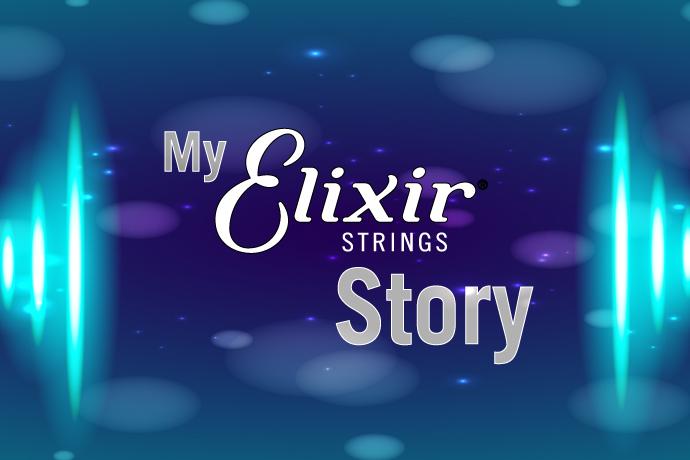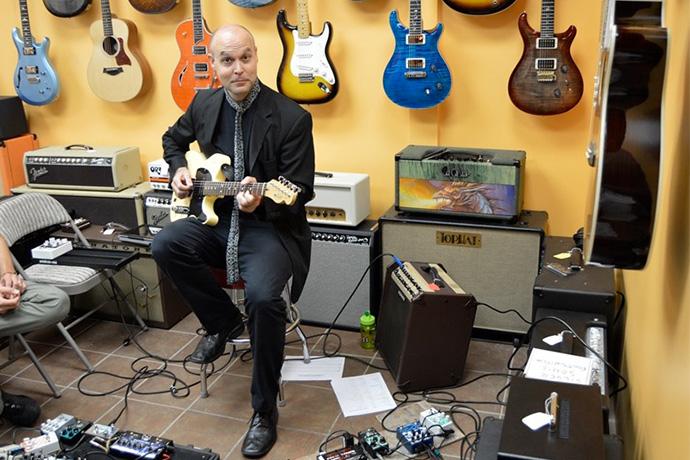
Elixir Strings
How “Dabble Time” Birthed a New Industry

How does a company whose products serve NASA, Disney and all branches of the U.S. Military; a company that produces advancements for construction, agricultural and telecommunication equipment; a company that made its name by creating innovative, technology-driven solutions – from medical devices that treat aneurysms to high-performance GORE-TEX® fabrics – come to pioneer coated guitar strings? One of the inventive engineers at Elixir® Strings tells us all about it.
John C. Allen, R&D, NPD, Technical Leader at W.L. Gore & Associates, was an integral member of the Elixir Strings engineering and development team in the mid-1990s. John’s excitement is palpable and inspiring as he talks about the job, the innovations he contributed to and the joy Elixir Strings brings to his life – as well as the lives of countless other musicians.
You came on board early in the development of Elixir Strings. Tell me a bit about the origins of Elixir Strings...
-
Continue Reading
It’s the classic story of Gore innovation. Gore encourages “dabble time” where associates take time to think about problem-solving or creating products of value. Some of our engineers were working on push-pull cables for Disney animatronics, using these long cables to animate the movements of the characters. The cables were difficult to handle, so one of the applications/solutions was to make a smoother, lower friction push-pull cable. The engineers were looking at guitar strings as a way to prototype that idea – because they needed something very thin and very strong. Once the strings were integrated into that process, engineering a long-lasting, great-sounding guitar string became a new goal.
What are some of the innovations you helped develop for Elixir Strings?
I helped develop the phosphor bronze strings and I worked a lot on the NANOWEB® Coating. Our goal was to be acoustically transparent. We invested a lot in tone testing: We studied the vibrational elements of wood and carbon fiber guitars. The guitars were mounted in a specific saddle, and there was a pendulum, with a known force, plucking with a pick. Then we used accelerometers to look at the frequency that was coming off the guitar so we could analyze the entire audible spectrum. Basically, we would make sure we weren’t augmenting the frequency response of the guitar by coating the string. We were doing that in concert with feedback from thousands of guitar players during test trials.
What were some of the biggest challenges you faced in string technology development?
Feel was very important, but the feel of an acoustic guitar versus an electric is very different. When you slide your finger on an electric guitar string, the pickup picks that up. Or when you perform a pick scrape down a wound string. Then you have to combine those techniques with the type of pickups on your guitar and your effects. Now if you coat a string, one thing acoustic players love is the smoothness, but on electric guitar you run the risk that the smoothness is going to take away the amplitude of those vibrations that create a great, nuanced electric sound. So it’s important to test, play, interact and understand those things to develop the best string possible and meet each player’s needs.
We also had to develop Anti-Rust Technology for the unwound steel strings, but that was a completely different process. We were concerned, “Would the wound strings outlive the plain steels?” We even wondered, “Should we ship two sets of plain steels?” Instead, we developed a plating technology that would enhance the life of the plain steels to make them last as long as the coated ones.
My understanding is, at the lab, you’re engaged in all manner of chemical engineering, mechanical engineering, acoustic engineering, sophisticated data analysis and other such complex, scientific activities: At what point do you pick up a guitar and just play?
It’s funny because we had a mechanical testing lab that was filled with tensile testers, pick testers, twisting testers, all kinds of mechanical testing, but then I got these curtains that I think were from NASA for a space station (laughs) – really heavy, with great acoustic isolation. We hung these curtains up in the lab, put down a carpet and stuck foam up in the corners, so that when you walked through the curtains you suddenly felt like you were in a recording studio. So you could go work on a string, then stick it on a guitar and go play it in “the studio” and really listen to it.
We’d play all the time. We’d put strings on one guitar versus another, come back the next day, “Does it sound the same?” “Did it go out of tune for some reason?” We would halfway coat a string – half is coated, half of it is not: “How does that feel? What’s the difference?” We would always pick up guitars and try to flex both sides of our brains.
One last question: How often do you change your strings?
Now that I have young kids, I don’t play as much as I used to. But I do have six guitars and even if I don’t play them that often, I know I don’t have to worry about the strings – they’ll be ready to play whenever I am.
International Roadie: A Human Swiss Army Knife

Some of the biggest names in the music industry entrust Ryan Huddleston with their sound. From pop superstar Taylor Swift and rock icons Train, to multiplatinum metal band Avenged Sevenfold, Ryan has worked with every style, on every level, providing a multitude of services.
“I’ve been told I’m a human Swiss Army knife,” Ryan laughs – but it’s no joke. Among other jobs, Ryan has worked as a guitar and drum tech, backline specialist, front-of-house engineer, computer technician, recording engineer and stage manager. And before he started touring as an international roadie, Ryan was employed in one of the biggest certified guitar repair shops in the U.S., working on as many as 100 instruments and amplifiers a week! Ryan has also released his own instructional DVDs titled “The Tricknology Video Series,” which teach a variety of skills for aspiring audio engineers and backline technicians. So when it comes to helping musicians sound their best, Ryan Huddleston knows what he’s talking about.
How did you develop so many diverse music tech skills?
-
Continue Reading
My dad owned a music store when I was a kid, so I was exposed early on to music, bands and recording studios. Around 13, I tried to change the pickup in my guitar and got some solder in my eye. Right then I realized, “There’s got to be a better way of doing this!” So I started reading books and magazines and asking musicians about what they knew.
Then I began learning as much as I could about being in a band, maintaining my gear, using the PA system, et cetera. All that blossomed around the time I hit college. I went to Miracosta College, where they have a huge music facility, great teachers and vast resources. I ended up completing six different degree programs there: I studied recording arts, live sound, stage performance, digital audio, stagecraft, business, a little bit of everything.
At the same time that I was going to school, I was also working in a music store doing guitar repair. So I was getting “real-life” experience as well as the college experience.
Later, around 2004, right out of school, I got hired as a drum tech for The Go-Go’s. One day I heard the guitar tech say, “We need to send these guitar amps in to get rebiased.” I said, “I can do that, I have the tools in my car.” Everyone was surprised. I said, “Doesn’t every guitar tech know how to bias an amp?” They told me flatly, “No.” Being only 21, I didn’t realize how sharp my skills were. After that, I just kept getting hired by bands for a variety of jobs, whatever anyone needed.
Was it then, as a roadie, that you started using Elixir® Strings?
Before I started working with big name, touring artists, when I was working at String Masters, my job every Saturday was to restring twenty-fifty guitars! And I always loved using Elixir Strings. So I fell in love with Elixir Strings before I was even touring.
Later, after my first tour with Green Day, The Go-Go’s management liked me so much they hired me to work with Joss Stone. Joss and her guitarist David Gilmore (a jazz player from Brooklyn) had a great relationship with Elixir Strings, so I forged a personal relationship through them. Now, here I am, years later, and I’m still using Elixir Strings.
Making that connection early on was a huge benefit because, for one, they’re incredible strings – they do everything they’re supposed to – and two, having the support and the service of the company – getting what I needed in time – it’s just so critical. Nobody wants to hear excuses from a guitar tech, so it’s nice to deliver what’s expected. Elixir Strings make my job so much easier, I never have to struggle.
What specifically is it about Elixir Strings that makes your job easier?
So many things, for instance: The tone is great, they stay in tune and since Elixir Strings are coated they are protected from sweat and debris buildup – they really hold up and don’t suffer the typical problems of other strings. Also, I’ve never seen Elixir Strings rust. Every other string tends to rust with time or from an excessively sweaty player. And then that rust affects your frets; it puts rust on your pickup coil, the magnet poles; it affects the bridge. So not having to deal with rust is a huge lifesaver. It actually makes your instrument last longer – let alone your strings.
Tell me about your experiences with Elixir Strings when it comes to live performance versus studio recording.
I’ve done tons of mobile recordings with artists, Taylor Swift, Kelly Clarkson and on and on. So field recording, studio recording, live recording, I have my hands in all of that. Across the board, Elixir Strings always sound great, with a microphone or coming out of a quarter-inch jack, on all levels they’re a ten – it’s what I aim for.
I do backline and I do front-of-house audio, so I learned early on that you can’t get good sound if you don’t have good equipment. This includes the smallest details. If you have bad guitar strings, you’re never going to get a good recording. Elixir Strings always perform.
And how many of the artists that you work with use Elixir Strings?
I would say close to one hundred percent. I have even dealt with guitar players who had deals with other string companies, and I always recommend they try Elixir Strings. Even if they’re skeptical, once they try Elixir Strings they say, “Wow! These feel great and sound incredible!”
Pushing Boundaries: Mixing Effects, Tones and Synth Sounds
Bassist Chris “Fatty” Hargreaves grew up listening to everything from prog rock and funk to metal, jazz and everything in between. In his late teens, while studying jazz at Leeds College of Music, Chris became interested in music production and immersed himself in the study of electronic music and effects. As a result of his passion for electronic dance music, inventive production style, and innovative bass playing that employs a vast arsenal of effects, tones, and synth sounds, Chris has become a major figure in the hip-hop, grime, and dubstep scenes in England.
For the past several years, Chris has toured all over the world with pop artist Alex Clare, as well as his own band, Submotion Orchestra. He recently played bass for the David Bowie musical Lazarus during its run in England. Elixir® Strings caught up with Chris on his houseboat, on a typically wet and foggy London day.
How long have you been using Elixir Strings?
-
Continue Reading
Since about 2012. I met the Elixir Strings team at the London Bass Guitar Show where I had been asked to do a masterclass on electronic music, which is what I mainly do. There, the team hooked me up with some NANOWEB® Coated Light, Long Scale strings, and that is what I have been playing ever since.
You live in London where the weather is notoriously capricious; have you noticed that Elixir Strings are particularly suited to handle dramatic changes in humidity and temperature that can affect string life, tone and playability?
Most certainly. Elixir Strings are super consistent and seem to last for ages, no matter the weather or what instrument I’m playing. Also, when I’ve been abroad I’ve never noticed any changes. I put a fresh set on at the start of a tour, and I keep them on the entire time. The consistency of Elixir Strings, live or in the studio, means it’s something I don’t have to worry about when I’m trying out ideas; I’ve got enough things to worry about with pedals and electronics, so not thinking about whether a string is going to break or won’t sound good makes everything easier.
Regarding tone, for a lot of the stuff that I do, which is mainly synth-based, I don’t tend to worry about tone; what’s really amazing about Elixir Strings is the feel of them – they feel bloody amazing! I got a loaner bass off of Gibson the other day, which had these horrendous strings on it. They felt like they were cutting my fingers up. But as soon as I put Elixir Strings on it I could fly up and down the fretboard super easy.
The guitarists on the Lazarus show said the same thing – because they both got Gibson guitars loaned to them as well, and straight away we all switched the strings. That’s one of the reasons I was looking forward to this interview, because we were literally all using Elixir Strings!
That’s the David Bowie musical Lazarus you’re talking about, correct?
Yeah, I did the show for 14 weeks at the end of 2016, and it ran into January 2017. So I was playing a lot; we were doing eight shows a week. Then I went straight to rehearsals for Alex Clare, and we went on tour for five weeks.
Your role as bass player changes dramatically between playing with Alex Clare, Submotion Orchestra and Lazarus: Would you talk about the differences between these gigs?
Well I grew up playing in big bands, so I’ve always played jazz and done traditional bass things. I love playing “normal” bass; it’s great. But at college I was living with a lot of producers, so I got to learn about production techniques. Then I got heavily into synthesizers, so I basically married the bass and the synth. Later, I learned how to build pedal boards to create those sounds on the bass. Because this synth approach is quite niche it’s mainly what I get called to do, such as my work with Alex Clare and my own band, Submotion. But in Lazarus my role was more that of the traditional rock bassist, which I love to play as well.
Regarding that “niche” approach you just mentioned: One could easily make the argument that you’re not a bass player at all; you’re a “low frequency” player. Do you think you are approaching music on a slightly different level than most musicians?
It’s definitely a different approach. The more I’ve gotten into production and writing songs … you then have a different mentality. It’s not about, “Can I fit in this massive fill at the end of these eight bars?” It’s about, “What does the song need?” I also consider the different aspects of sonics: How the bass fits within the mix is so important.
You also exploit the overtones of the bass, not just focusing on the fundamental. You might play one note, but then the various effects transform it, allowing you to maintain the low end while exploring the upper harmonics.
That’s exactly it! There are a lot of dubstep producers who use that idea: They would call it “parallel compression,” where the sub, which would sit low in the mix, could often be side-chained with the bass drum, but then they would have a separate channel that they could then distort or trade different harmonics off that one and slide that into the mix. So you have these different levels of sonics and bass sounds but all via the same note. That’s what I tend to do by splitting the signal as many times as possible to create as many options … and then be able to alternate sounds with pedals.
Are you sending those signals to different amplifiers?
Yes, I send them directly to the desk through three or four different XLRs’ signals. Then, on stage, I group them all together to send them to a bass amp, but they all have a different EQ, so they won’t get in the way of each other.
You also do a lot of live looping wherein you take advantage of the bass’s full tonal range, including percussive tones: Do you find that Elixir Strings are particularly well suited for this purpose?
Sure, but I would say that, although Elixir Strings are rich and full-sounding, it’s more about how I can get around the fretboard so easily, and every note I play is nice and neat and tidy. When I play the synth stuff everything needs to be consistent because I’m triggering sounds. Everything needs to be considered – where you’re playing your lines, the velocity at which you play needs to be steady – so the best way to do that is to play very cleanly and consistently. Elixir Strings make that easy
The Many Faces of Shawn Persinger

Progressive rock, “new” acoustic music, slide, jazz, fingerstyle, rock, country – it seems that guitarist, educator and writer Shawn Persinger (aka Prester John) plays it all! In fact, for the audio portion of his best-selling instructional book, “The 50 Greatest Guitar Books,” he did have to play it all. "I had to record lessons in the style of Steve Vai, Brad Paisley, Paco De Lucia and many, many others. Luckily, the examples are only four to eight measures – I can fake it for that long!"
Persinger maintains a busy writing schedule – he contributes to both “Premier Guitar” and Taylor Guitars’ “Wood&Steel” – and also continues to create his own original music. His latest recording, entitled “Halloween Baptizm,” is a unique guitar quartet that features him, multi-tracked, playing all four guitar parts. Like his published lessons, the new release – which is like a blender of acoustic guitars playing the music of J.S. Bach, James Brown, Philip Glass and Frank Zappa – reveals his diverse musical interests
This past year has been a busy one for you. How many different projects are you currently working on?
-
Continue Reading
It’s not so much about how many, it’s how much time those projects take… “Halloween Baptizm,” the new guitar quartet I recorded, had most of my attention this year. I spent a couple of hours every week on that until last March, then I spent several hours each day until I was done recording; that took about four months.
As for my other projects, I recorded a soundtrack for a documentary called “Regarding Gravity,” which is going to premier at the Montreal International Documentary Festival this November. I would work on that every few weeks as new footage came in. That was a lot of fun because I used my Taylor 8-string baritone quite a bit; it was perfect for the atmosphere of the film, which is a bit mysterious – maybe “ambiguous” is a better word – yet also whimsical: The rich low end, endless sustain, and unexpected octave strings of the baritone were perfect for that anomalous juxtaposition. I’m so grateful Elixir® Strings makes strings for that unusual guitar. I also recorded some cantankerous electric guitar for the soundtrack, layering multiple parts with heavily distorted melodies that overlap and feed back – like a looping “Air on the G String” played by Hendrix or Sonny Sharrock, quite contrary to the lush smoothness of the 8-string.
In 2016, I also started playing with a Jackson Browne tribute band called Running On Empty, though that band only plays every few months. When that group started, I was playing all the eclectic rhythm parts and 50 percent of the solos – legendary guitarist and educator Arlen Roth was handling the other 50 percent, including all the slide parts. Well, last April, Arlen left the band, and my parts doubled overnight! I had to learn all those amazing slide solos and, though I’ve played a bit of slide – enough to show students the basics – it’s hardly my forte. So I’ve played more slide in the last two months than I had in the 20 years prior!
I have to say, the new Elixir OPTIWEB® Coated Strings feel great for slide! You see, I’ve been playing Elixir POLYWEB® strings for 17 years, so when the OPTIWEB Coating for electric strings came out I was a bit skeptical – I like the slick feel of the POLYWEB Coating. But the feel, not to mention the tone, of the OPTIWEB Coating…has a little more grip – a grip that the slide really takes to. So OPTIWEB Coated Electric Strings were introduced at just the right time for my needs.
All that and you also teach private lessons.
Private lessons, and I began teaching classes at the University of New Haven last year too, The History of Rock. So, yes, I keep busy. One of the things I love about teaching is getting to work on a wide variety of styles with various students. Just last night I went from '80s “hair metal” – Mötley Crüe, Ratt, and Def Leppard – to fingerstyle ragtime to King Crimson in the space of three lessons! Not only does that allow me to play in different styles, but it also means I have to be able to explain what’s going on in each context; that keeps me on my toes.
And how many of your students use Elixir Strings?
Once they start with me, all of them! Anyone who doesn’t use them already, I just hand them one of my guitars, and they’re shocked at how great the strings feel! Elixir Strings makes other brands feel like barbed wire! Seriously, I’ve had students come in with strings so corroded that they’re virtually unplayable. This is a real drawback for beginners specifically because if they have bought a “new” guitar with uncoated strings that have been on there for a couple of weeks, they feel awful, sound awful, and make the guitar more difficult to play: The student often thinks this is their own fault! When this is the case, I start the lesson with a quick change to Elixir Strings and already the student feels better about their playing. Teaching doesn’t get much easier than that!
And what’s happening with Prester John, your duo with mandolinist David Miller?
Well, that’s an interesting story: At age 45, after playing music for more than 40 years, David decided to retire from live performance! I can’t say I wasn’t disappointed – David is a phenomenal player, and I don’t think we ever had a bad show – but I understood. He wanted to spend more time with his family and renovating his 200-year-old house! He still plays and teaches though, and still uses Elixir Strings on his mandolin. The one upside of all this is I figured out a way to play many of David’s parts by performing them on the higher register of my 12-string and using my loop pedal.
Can you give us an example of how Elixir Strings helped you while recording “Halloween Baptizm”?
Easily! I recorded that album over a period of months, playing one part then another, then coming back and refining parts and punching in. I had to play 52 different parts in all! As a result, string tone needed to be consistent; I didn’t want a dull punch-in two weeks after the initial take. Using Elixir Strings meant I never had to give this a second thought. I literally could record a lead melody on the 6-string in March and then punch in a new articulation in May without anyone ever noticing a difference in string tone! That was vital!
Fifty-two different parts? What inspired you to do that?
It was a combination of things, but basically, I have had the idea of the guitar quartet for many years and finally the time was right. There were a lot of logistical issues – not to mention an artistic compulsion – that compelled me to play all the parts myself, but I hope that soon I’ll be able to play "Halloween Baptizm” with three other guitarists. Or maybe four others will play it without me! I would love that. I hope that this guitar quartet will encourage guitarists to play together in new ways.
Busy Guitarist Talks Tips, Gear and Pranks

Greg Karas is one of the busiest guitarists working in the pop/rock music business today. You (along with ten million-plus other viewers) might have seen Greg playing guitar in Andy Grammer’s “Good To Be Alive (Hallelujah)” video, or perhaps you’ve caught him on a variety of television shows backing both Grammer and vocal girl group Fifth Harmony. Greg also played acoustic guitar on Toots & the Maytals’s 2008 Grammy-nominated song “Light Your Light” and has performed and/or recorded with an eclectic assortment of artists, from singer-songwriter Colbie Caillat to one-time Jimi Hendrix drummer Buddy Miles.
We caught up with Greg during a rare break in his tour schedule to talk about touring, strings and advice for beginner guitarists.
How long have you been using Elixir Strings?
-
Continue Reading
I’ve been using Elixir Strings for ten-plus years. I was still in high school when I heard about Elixir Strings, and the whole idea of the coated string to prevent corrosion and to keep them sounding new was super intriguing to me. Then, as soon as I started checking them out, I thought, “Wow, this is great! They do exactly what they claim!” They always sound fresh, clear and crisp. And they last so long … In fact I had some residencies at a couple of different venues, performing in my acoustic duo, and I had a set of Elixir Strings on my Taylor guitar for many, many months! I thought it was really impressive how much mileage I was able to get out of one set of strings.
Then while touring with Andy Grammer, I ended up connecting with Elixir Strings and developing a relationship with them. I invited them to some shows, and I was so impressed with them, as people and as a company.
You tour and record with Andy Grammer, as well as a host of other artists: How do Elixir Strings benefit you on tour versus in the studio?
On tour or in the studio, gear consistency is of paramount importance to me – to musicians in general – because there are so many nonmusical, uncontrollable variables we have to deal with on a daily basis. So if I’m recording, and I’m in the zone, I want to have the peace of mind to know that if I pull out a specific instrument for a specific color, that it is going to sound as consistently good as it did a few weeks ago. And that’s important in both settings. Elixir Strings give me that peace of mind.
Can you give any advice to young players on how to handle mistakes during a performance?
Yes! ALWAYS play through your mistakes, whether on stage or while practicing. We are human and mistakes are inevitable, even if you're the greatest musician ever. You just get better at covering them up! Just remember the most important thing is the song. It’s not fair for the rest of the band to stop and start all over if you make a mistake - the show must go on. Play through your mistake, try not to call too much attention to it or let it get to you. If you do, it will just affect your vibe and energy while performing.
You play Elixir Strings on your acoustics and electrics: What do you like about the OPTIWEB® Coating for electric strings?
Elixir Strings sent me a set of the OPTIWEB Coated Electric Strings when they were still in development. I put them on my main guitar – a custom, handmade Strat with stainless steel frets – as I knew it would be the perfect litmus test because I play the heck out of that guitar. And I loved them! They feel fantastic. And, sure, you can tell that there is a coating but it is very, very slight. Regarding tension and feel, I think Elixir Strings nailed it. I can really dig into the strings – and I’m not a light player – and they always respond. Also, I have my tremolo set up so it’s floating, so I’m really used to the way strings react to a floating tremolo. String tension has a lot to do with how that feels – the OPTIWEB Coated strings feel great!
What advice do you have for younger players, or beginners, regarding the importance of guitar strings?
The problem that beginners have is that they don’t know what a quality instrument feels like or sounds like. They might have a vague idea if they have a guitar teacher who has nice gear, but if they pick up an instrument in a guitar store that has old strings versus new strings, they might think a good instrument doesn’t feel good simply because of the string quality. Or, if they buy a good guitar with new, but non-Elixir Strings on it, they take it home; in a few days, if they don’t wash their hands before playing, or take good care of their instrument, the strings will feel nasty, and the guitar won’t seem as good. That makes practicing discouraging. But Elixir Strings keeps a guitar feeling new and sounding good, which allows you to play well and stay inspired.
What's the funniest thing that ever happened to you on stage?
Oh man, that’s a hard one considering I play for one of the biggest pranksters ever. We have quite a few funny stage stories. Every time we are on a big bus tour with support acts, we almost always end the tour with some kind of tour prank. We toured with Rachel Platten and Alex and Sierra in the spring of 2015 and ended in Salt Lake City. After we pranked all of them pretty hard, they pulled out all of the stops. Rachel showed up with full drag costumes and makeup for all of us and got us pretty early in the set. They came out mid song and dressed us and "applied" makeup. We had to finish our whole set in full drag and makeup. That was pretty funny, but we really got them good too!!!
